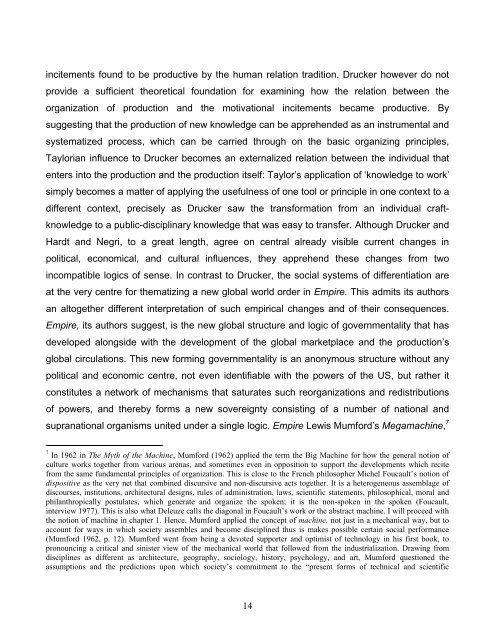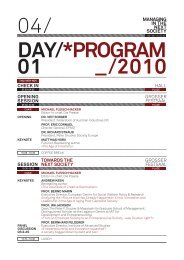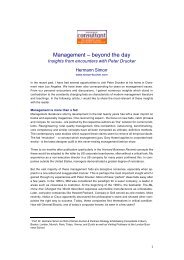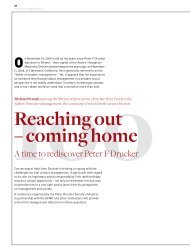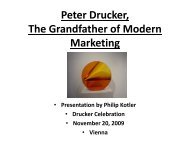From Industrial Capitalism to Taylorian Late Capitalism
From Industrial Capitalism to Taylorian Late Capitalism
From Industrial Capitalism to Taylorian Late Capitalism
You also want an ePaper? Increase the reach of your titles
YUMPU automatically turns print PDFs into web optimized ePapers that Google loves.
incitements found <strong>to</strong> be productive by the human relation tradition. Drucker however do not<br />
provide a sufficient theoretical foundation for examining how the relation between the<br />
organization of production and the motivational incitements became productive. By<br />
suggesting that the production of new knowledge can be apprehended as an instrumental and<br />
systematized process, which can be carried through on the basic organizing principles,<br />
<strong>Taylorian</strong> influence <strong>to</strong> Drucker becomes an externalized relation between the individual that<br />
enters in<strong>to</strong> the production and the production itself: Taylor’s application of ‘knowledge <strong>to</strong> work’<br />
simply becomes a matter of applying the usefulness of one <strong>to</strong>ol or principle in one context <strong>to</strong> a<br />
different context, precisely as Drucker saw the transformation from an individual craft-<br />
knowledge <strong>to</strong> a public-disciplinary knowledge that was easy <strong>to</strong> transfer. Although Drucker and<br />
Hardt and Negri, <strong>to</strong> a great length, agree on central already visible current changes in<br />
political, economical, and cultural influences, they apprehend these changes from two<br />
incompatible logics of sense. In contrast <strong>to</strong> Drucker, the social systems of differentiation are<br />
at the very centre for thematizing a new global world order in Empire. This admits its authors<br />
an al<strong>to</strong>gether different interpretation of such empirical changes and of their consequences.<br />
Empire, its authors suggest, is the new global structure and logic of governmentality that has<br />
developed alongside with the development of the global marketplace and the production’s<br />
global circulations. This new forming governmentality is an anonymous structure without any<br />
political and economic centre, not even identifiable with the powers of the US, but rather it<br />
constitutes a network of mechanisms that saturates such reorganizations and redistributions<br />
of powers, and thereby forms a new sovereignty consisting of a number of national and<br />
supranational organisms united under a single logic. Empire Lewis Mumford’s Megamachine, 7<br />
7 In 1962 in The Myth of the Machine, Mumford (1962) applied the term the Big Machine for how the general notion of<br />
culture works <strong>to</strong>gether from various arenas, and sometimes even in opposition <strong>to</strong> support the developments which recite<br />
from the same fundamental principles of organization. This is close <strong>to</strong> the French philosopher Michel Foucault’s notion of<br />
dispositive as the very net that combined discursive and non-discursive acts <strong>to</strong>gether. It is a heterogeneous assemblage of<br />
discourses, institutions, architectural designs, rules of administration, laws, scientific statements, philosophical, moral and<br />
philanthropically postulates, which generate and organize the spoken; it is the non-spoken in the spoken (Foucault,<br />
interview 1977). This is also what Deleuze calls the diagonal in Foucault’s work or the abstract machine. I will proceed with<br />
the notion of machine in chapter 1. Hence, Mumford applied the concept of machine, not just in a mechanical way, but <strong>to</strong><br />
account for ways in which society assembles and become disciplined thus is makes possible certain social performance<br />
(Mumford 1962, p. 12). Mumford went from being a devoted supporter and optimist of technology in his first book, <strong>to</strong><br />
pronouncing a critical and sinister view of the mechanical world that followed from the industrialization. Drawing from<br />
disciplines as different as architecture, geography, sociology, his<strong>to</strong>ry, psychology, and art, Mumford questioned the<br />
assumptions and the predictions upon which society’s commitment <strong>to</strong> the “present forms of technical and scientific<br />
14


